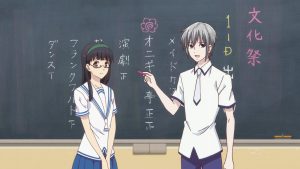 It’s funny how many of these little things from the original Fruits Basket I’d forgotten all these years later. When they pop up now – like Tohru’s charming analogy about everyone having an umeboshi on their back – it’s like a light switch goes off in my head and every feeling I associated with that moment in the series comes flooding back. It isn’t always a comfortable feeling, to be honest – it’s almost as if being infiltrated by the me of almost two decades ago is an invasion of privacy – but only something that we profoundly threw ourselves into at the time can have that effect.
It’s funny how many of these little things from the original Fruits Basket I’d forgotten all these years later. When they pop up now – like Tohru’s charming analogy about everyone having an umeboshi on their back – it’s like a light switch goes off in my head and every feeling I associated with that moment in the series comes flooding back. It isn’t always a comfortable feeling, to be honest – it’s almost as if being infiltrated by the me of almost two decades ago is an invasion of privacy – but only something that we profoundly threw ourselves into at the time can have that effect.
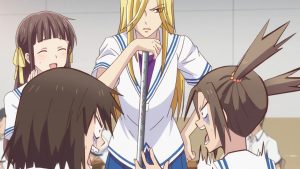 It also strikes me that some of the criticism of Fruits Basket I’m seeing now (which is pretty mild to be fair – it’s been quite well-received) stems from how pervasive its influence has been in shoujo manga and anime. We see this a lot with seminal older series – they get dinged by new viewers for being derivative of themselves. No, Furuba certainly didn’t invent tropes like the diffident male protagonist or the kindly but relatively vanilla female lead who changes the lives of the guys around her – but few series have ever been so imitated in their specific application of them.
It also strikes me that some of the criticism of Fruits Basket I’m seeing now (which is pretty mild to be fair – it’s been quite well-received) stems from how pervasive its influence has been in shoujo manga and anime. We see this a lot with seminal older series – they get dinged by new viewers for being derivative of themselves. No, Furuba certainly didn’t invent tropes like the diffident male protagonist or the kindly but relatively vanilla female lead who changes the lives of the guys around her – but few series have ever been so imitated in their specific application of them.
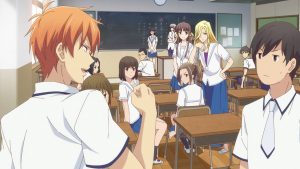 And now we’re starting to get into areas where I have to choose my words carefully. Because as ingrained as Fruits Basket is for me, I have to remind myself that an awful lot of folks are coming into the series fresh. I have strong opinions about this story that this week’s episode ties into very strongly, but I’m not sure how much I should be discussing them. What’s undeniable is the general theme that drove the episode (and indeed, much of the story) – the grass is always greener. This is the essence of Tohru’s plum analogy and as corny as it is, I think it’s quite a lovely way of looking at something that’s a fundamental truth of human existence. And this is one of Takaya-sensei’s gifts as a writer, using childlike analogy and metaphor to make profound ideas intimate and real (indeed, the series is named after a child’s game after all).
And now we’re starting to get into areas where I have to choose my words carefully. Because as ingrained as Fruits Basket is for me, I have to remind myself that an awful lot of folks are coming into the series fresh. I have strong opinions about this story that this week’s episode ties into very strongly, but I’m not sure how much I should be discussing them. What’s undeniable is the general theme that drove the episode (and indeed, much of the story) – the grass is always greener. This is the essence of Tohru’s plum analogy and as corny as it is, I think it’s quite a lovely way of looking at something that’s a fundamental truth of human existence. And this is one of Takaya-sensei’s gifts as a writer, using childlike analogy and metaphor to make profound ideas intimate and real (indeed, the series is named after a child’s game after all).
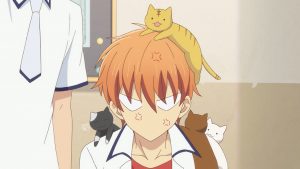 I should also note the arrival on the scene of this boy (Han Megumi – Gon and Kurapika reunited at last). I’ll lower my guardrails just a bit and confirm that yes, he’s going to be important – because truly, why would that encounter have happened otherwise? This is a character I don’t remember appearing this early in the first series (though my memory could obviously be faulty), but for me, the one that has probably the most emotionally powerful story amongst the entire cast. I really celebrated when Han-san was cast here, knowing (obviously) how she could knock it out of the park with boy roles. She has a lot to do but she’s more than up to it (though speaking German is a new one for her, I think). That whole business about Tohru saying “I don’t speak English” is a pretty common thing here, where any European tongue is often just assumed to be English.
I should also note the arrival on the scene of this boy (Han Megumi – Gon and Kurapika reunited at last). I’ll lower my guardrails just a bit and confirm that yes, he’s going to be important – because truly, why would that encounter have happened otherwise? This is a character I don’t remember appearing this early in the first series (though my memory could obviously be faulty), but for me, the one that has probably the most emotionally powerful story amongst the entire cast. I really celebrated when Han-san was cast here, knowing (obviously) how she could knock it out of the park with boy roles. She has a lot to do but she’s more than up to it (though speaking German is a new one for her, I think). That whole business about Tohru saying “I don’t speak English” is a pretty common thing here, where any European tongue is often just assumed to be English.
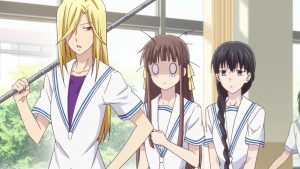 We do get to see inside Yuki’s shell a bit here, and Takaya gives us a bit of insight into why he is the way he is. The irony is not subtle – he’s the ultimate insider and wants to get out, and Kyou is the ultimate outsider who wants to get in. Kyou always loses, Yuki always wins. But there’s a fundamental truth in the way these two are depicted in the school setting. Perfection is off-putting – it makes people admire Yuki but pull away from him, whereas Kyou’s obvious flaws make him much more approachable. And Yuki is no fool – he’s aware of this in a way Kyou isn’t, because he’s cursed with perceptiveness (though of course he has a huge blind spot – right where Tohru said it was).
We do get to see inside Yuki’s shell a bit here, and Takaya gives us a bit of insight into why he is the way he is. The irony is not subtle – he’s the ultimate insider and wants to get out, and Kyou is the ultimate outsider who wants to get in. Kyou always loses, Yuki always wins. But there’s a fundamental truth in the way these two are depicted in the school setting. Perfection is off-putting – it makes people admire Yuki but pull away from him, whereas Kyou’s obvious flaws make him much more approachable. And Yuki is no fool – he’s aware of this in a way Kyou isn’t, because he’s cursed with perceptiveness (though of course he has a huge blind spot – right where Tohru said it was).
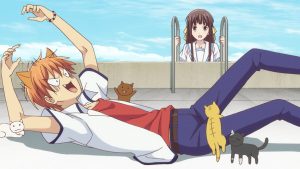 Again I need to be careful here, but maybe it’s safe for me to talk about how I felt when I saw all this play out the first time, whatever year it was. While I feel empathy for both primary guys here, the the thing with Yuki is, so much of his unhappiness is of his own making. He was born with so much privilege, gifted with so much talent, and in a way he chooses to be lonely and unhappy. As someone who never had an ounce of privilege that kind of thing has always sort of pissed me off, and it did with Yuki too. Takaya’s job with him is harder than Kyou, I think – but she has to make the connection between all of these Sohmas and the audience for this series to work as it’s intended to.
Again I need to be careful here, but maybe it’s safe for me to talk about how I felt when I saw all this play out the first time, whatever year it was. While I feel empathy for both primary guys here, the the thing with Yuki is, so much of his unhappiness is of his own making. He was born with so much privilege, gifted with so much talent, and in a way he chooses to be lonely and unhappy. As someone who never had an ounce of privilege that kind of thing has always sort of pissed me off, and it did with Yuki too. Takaya’s job with him is harder than Kyou, I think – but she has to make the connection between all of these Sohmas and the audience for this series to work as it’s intended to.
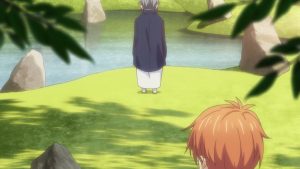 There’s another cameo here too – this girl, played by Kugimiya Rie (quite a departure from her role in Sarazanmai). Again, it’s not telling tales out of school to say she’s important because such encounters are never coincidental in anime. The web gets thicker, strands always being added, intersecting each other and sometimes tangling – that’s the Sohma clan. The danger with Tohru, of course, is that she becomes the bland catalyst at the center of all these chemical reactions – but while the role she fills here does run that risk, I think she mostly escapes it because she embodies it so well. It’s another of Takaya’s lovely metaphors come to life – all of us are born with the same desires, but our kindness grows (or doesn’t) along with us, and each person’s is unique.
There’s another cameo here too – this girl, played by Kugimiya Rie (quite a departure from her role in Sarazanmai). Again, it’s not telling tales out of school to say she’s important because such encounters are never coincidental in anime. The web gets thicker, strands always being added, intersecting each other and sometimes tangling – that’s the Sohma clan. The danger with Tohru, of course, is that she becomes the bland catalyst at the center of all these chemical reactions – but while the role she fills here does run that risk, I think she mostly escapes it because she embodies it so well. It’s another of Takaya’s lovely metaphors come to life – all of us are born with the same desires, but our kindness grows (or doesn’t) along with us, and each person’s is unique.


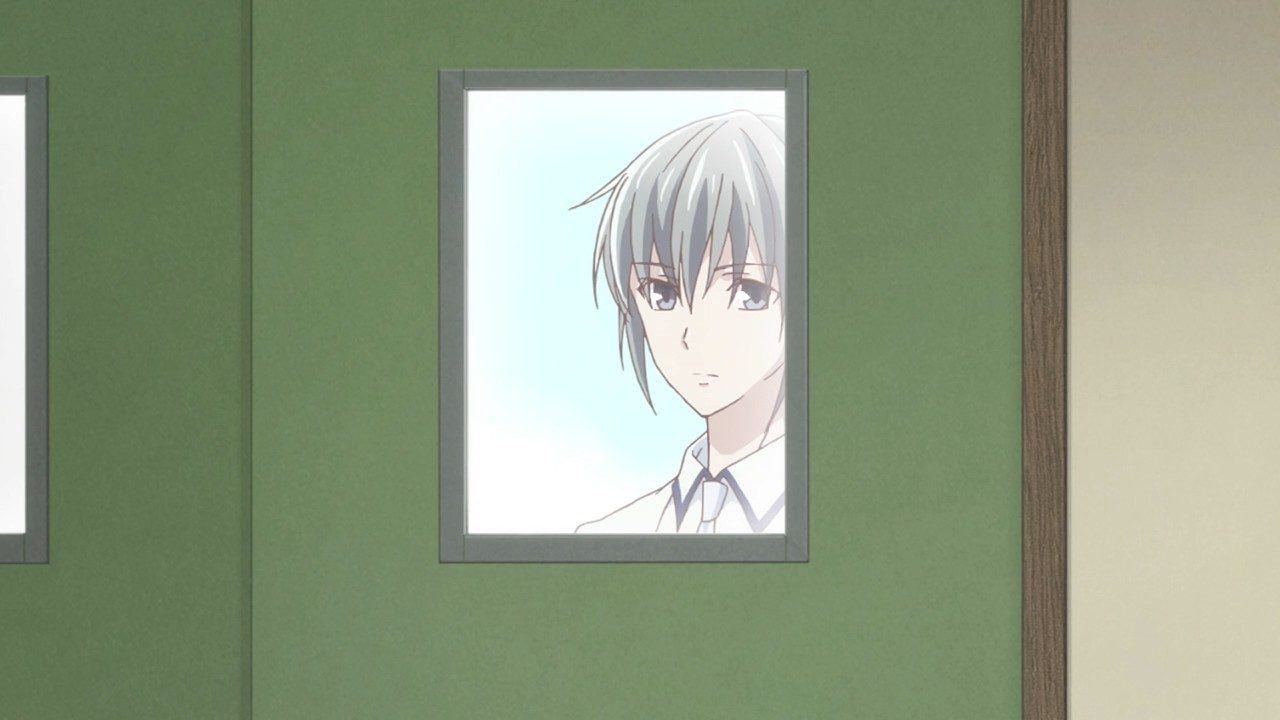
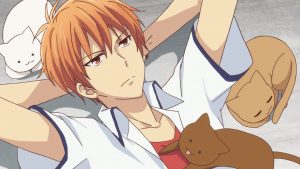
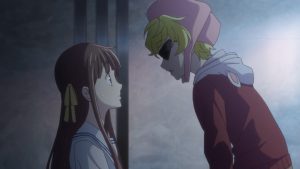

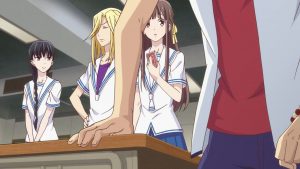
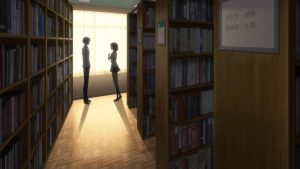
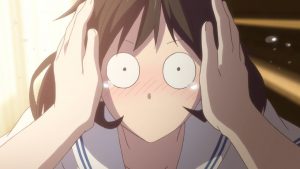
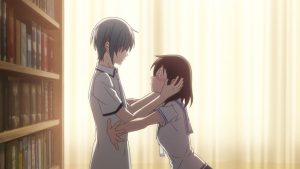
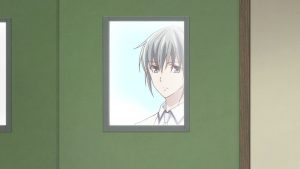

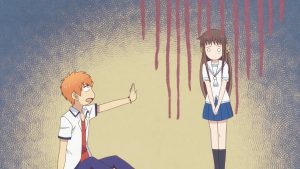
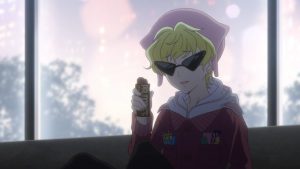
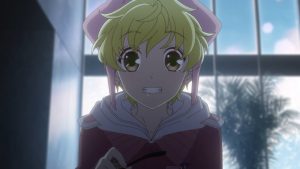
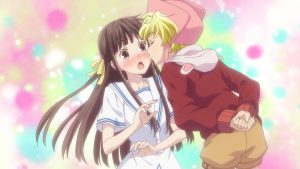
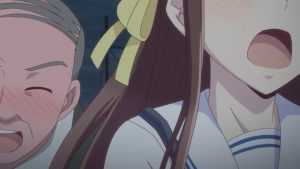
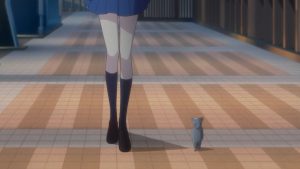
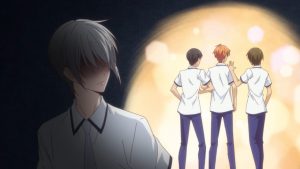
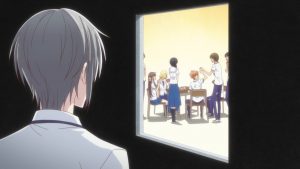
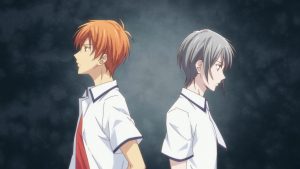

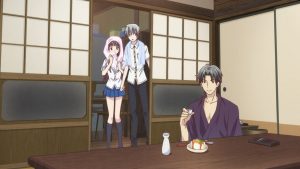
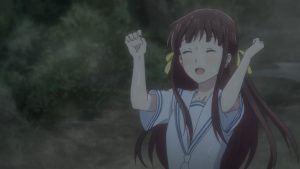

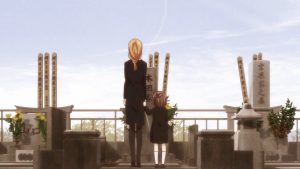
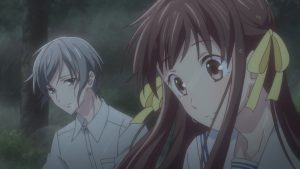

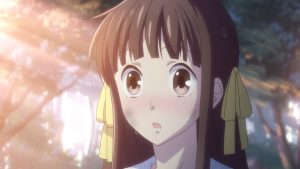

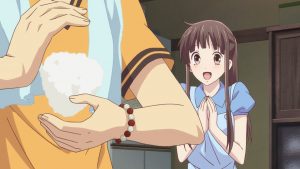

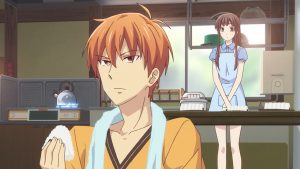
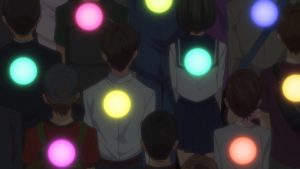
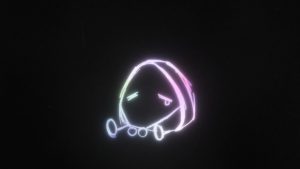
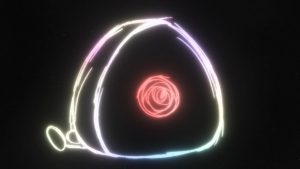
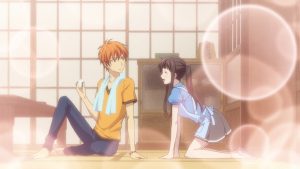
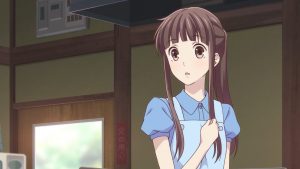
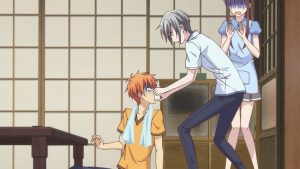

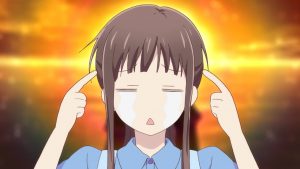
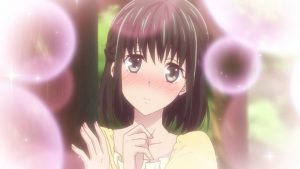


Gracie
April 20, 2019 at 6:59 pmI don’t agree with your comments about Yuki because even ignoring the manga, one can come from privilege or be immensely talented and still suffer from mental illness or come from an abusing environment or whatever. I know, woe rich boy… Even in this three episodes, it’s been established that the Sohma clan is not all milk and honey. *cough* the threat to wipe Tohru’s memory *cough*
It’s been established that Yuki’s been traumatized by what happened in the past and gaslighted by Akito. Moreover it’s implied that his presence in this co-ed school, is a privilege that could be taken at any time. So keeps himself on the outskirts not out some gratuitous aloofness, but because there are real consequences if he does a mistake.
Regarding the boy, he originally appeared in episode 7 , but this episode ties into his appearance in the first series. I don’t think he appeared so early even in the manga. But man I hope Han Megumi doesn’t intend to keep that accent because it is a lot to take. But while Shimazaki Nobunaga is hopeless and definetely won’t improve, at least there’s still a chance for Megumi to knock it out of the park.
While last week I found Yuki’s seyuu bland and boring, I didn’t mind Tohru’s, but now I’m now finding that Iwami Manaka also does a pretty poor job and by poor I mean unmemorable. Let’s say she’s no Miyu Irino of the female seyuus.
Guardian Enzo
April 20, 2019 at 7:30 pmAs I said last week, the bar for Iwami is unfairly high – Horie Yui’s performance in the first series may be my favorite female seiyuu performance of all time. It’s note-perfect. As for Han Megumi, bear in mind she’s going to be speaking Japanese eventually (spoilers, but – duh) so I don’t think the accent will be a problem.
I would love to engage you on Yuki, but I don’t really feel I can make my argument without dipping into events which haven’t happened in the new anime yet. So I’ll defer for the nonce.
Gracie
April 20, 2019 at 8:06 pmOh I agree with you on Iwami and she’s adequate overall. I’m more disappointed with Shimazaki because as I said last week, he has the ability to personalize a role (see Shinichi Izumi, Takatori Madoka, Handa Sei to some extent), but here he’s in Nanase Haruka mode and it feels like he didn’t try at all and that he’s too old for the role.
After all, the characters mentioned above were older than Yuki and when he does younger characters, he tends to go the Haruka mode. It’s weird that they cast him as a middle schooler. Shinnosuke Mitsushima would’ve been perfect.
Catch up on the character discussion later on in the series.
Guardian Enzo
April 20, 2019 at 8:23 pmWell, to be fair they’re supposed to be 16 and in high school, not middle schoolers.
Gracie
April 20, 2019 at 8:49 pmTrue but still the character design leans on youthful not mature…
I don’t think the seiyuus being unremarkable is a bug since in the original the voices could be rather jarring and I can see how that might not work with current audiences. Takaya’s moratorium notwithstanding.
Wangwang
April 21, 2019 at 11:12 amI think Yuki is an introvert. Introvert want to interact and have fun with people but their mind keep pulling themselves back. It has nothing to do with talent or privilege. An introvert will always feel lonely whether they rich or poor, gifted or not.
Daisy
February 23, 2020 at 1:50 pmI came across your blog recently and I’ve been really enjoying your reviews. That being said, your statement that Yuki’s “unhappiness is of his own making” just doesn’t sit right with me. As someone who has struggled with self-hatred and strongly relates to Yuki as a result, I find it a very damaging thing to say. Although Yuki can definitely take actions to improve his situation, he doesn’t “[choose] to be lonely and unhappy”. He distances himself from others because that’s his coping mechanism. He made friends but lost them because of his curse. He’s been taught that people who get close to him will be driven away by his curse as shown in episode 2. He doesn’t know how to make meaningful connections with others because he’s never been able to maintain a deep friendship with people outside of the Sohma family. Yuki’s statement about how he’s only nice because he wants others to like him shows that he is an introspective person who thinks poorly of himself. I, too, am very self-reflective and knowing that other people have much harder lives but are much stronger emotionally was one of the main reasons for my self-hatred. I was blessed with a loving family, friends, and luxuries so when I noticed my many faults, I began to think “Why am I (insert flaw) when I’m blessed with so many things? All the love I receive is wasted on me. Someone else born in my place would’ve made my parents happier.” Blaming someone’s misery on them is one of the worst things you can say to someone suffering from self-loathing like Yuki.